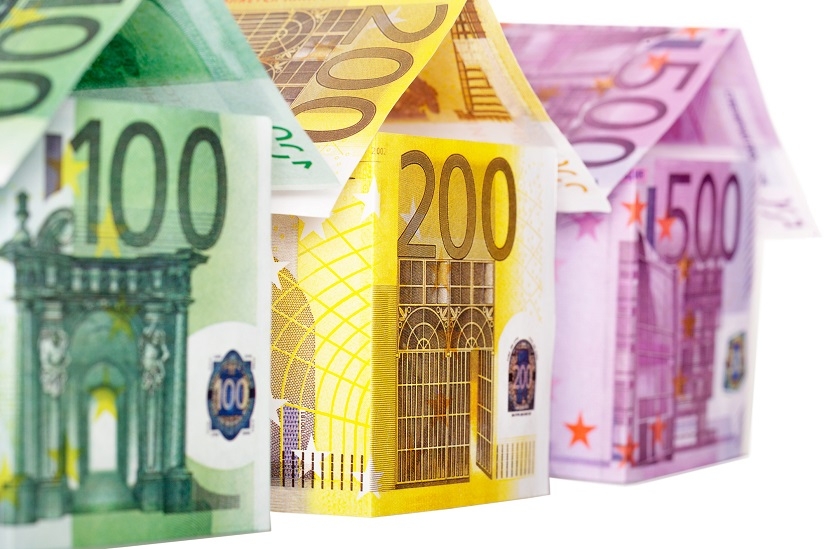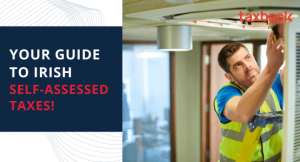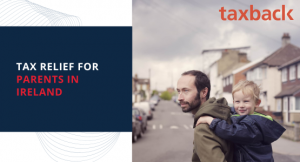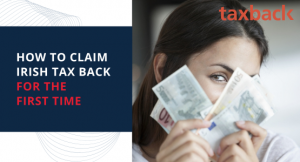Tax and Irish Rental Income – What You Need to Know
Forget the jargon! Ireland's rental tax system broken down:
Do you earn rental income – either from letting out a property or a room in your home?
If you answered yes to that question then you'll no doubt be aware that you're liable to pay tax on your rental income (unless you fall under the rent-a-room scheme – more details below). What you may not know is how much tax you should be paying, how and when you are supposed to pay it, and if you're entitled to any tax rebate.
Fortunately, we're on hand to answer all of your questions!
So let's get started.
If you are a landlord, you could be due a tax refund
Tax on rental income
How is rental income taxed?
If you receive income from renting out a property, or from another source that qualifies as rental income, it is taxable.
Generally speaking, you'll pay either 20% or 40% tax on your net rental income, depending on your personal circumstances (marital status, how much you're charging tenants, whether you have other forms of income, etc).
Rental income includes:
- the renting out of a house, flat, apartment, office or farmland
- or payments you receive for:
- allowing advertising signs or communication transmitters to be put up on your property
- allowing a right of way through your property
- allowing sporting rights such as fishing or shooting rights on your property
- the cost of work to your rental property (paid by the tenant). Your tenant must not be required to pay for this work per the lease
and:
- certain lease premiums, as well as deemed and reverse premiums
- conacre lettings
- service charges for services connected to the occupation of the property
- payments from insurance policies that cover the non-payment of rent

How much rent can you earn before you pay tax?
The answer to this question depends on whether you are:
- renting out an entire property
- renting out a room in your home on a long-term basis
- renting out a room in your home on a temporary or short-term basis
We have a tax return service for Landlords
(1) Renting out an entire property
If you expect to have rental profits of greater than €5,000 per year, then you will be considered by Revenue to be a 'chargeable person' and you will have to register for income tax (by completing a TR1 form) from the date that the property was first let. You must then file a Form 11 tax return at the end of each tax year.
If your profits will be less than €5,000 per year, you will not be considered a 'chargeable person' and you will not be required to register for income tax. But you will still have to pay tax on this income. However, instead of filing Form 11, you must file a Form 12 annually.
Note:
You will need to prepare an income tax return every year, even if you think you do not have a tax liability.

(2) Renting out a room in your home on a long-term basis
If you're letting out a room in your home over a long-term period, and you earn no more than €14,000 in rental income in a tax year, you may be able to avail of rent-a-room relief (more below).
If you earn more than €14,000 in rental income in a particular tax year you will have to pay income tax and file a Form 11 tax return.
(3) Renting out a room in your home on a temporary or short-term basis
If you let a room in your home – or your entire home – on a temporary basis (for example via Airbnb) you will not be able to avail of rent-a-room relief.
If you earn more than €5,000 in rental income per year you will need to register for income tax and complete Form 11 tax return each year. If your rental income amounts to less than €5,000 per year, you must file a Form 12 each year.
What is the tax deadline for my rental income?
The deadline for filing your tax return and paying tax on your rental income is 31 October each year.
I want to rent to a family member. Will I have to pay tax on this?
Yes. Tax will be due if you rent property to a member of your family.
It's also important to note that if you are renting out a room in your home to your son or daughter you will not be able to avail of rent-a-room relief. However, there is no rent-a-room relief restriction if you are letting a room to other family members.
It is also worth remembering that if you provide rent-free accommodation (outside of the family home) to a child, this will be deemed a gift and it may be subject to tax.
Both parents can each give an annual tax-free gift to a value of €3,000 to their child (€6,000 in total). If the annual market value of the rent is worth more than the gift allowance (€3,000 - €6,000, depending on your circumstances) then tax will be due. If it is worth less than the gift allowance, no tax will be due.
Rent-free accommodation provided to a child who is either under 18 or under 25 and in third-level education will be exempt from tax.
If you are a landlord, you could be due a tax refund
Rental expenses
What rental expenses can I claim?
There are a number of items that can be deducted from your rental income to reduce your overall tax liability.
Examples include:
(1) PRTB Registration
You can claim back the full amount for both the initial fee you pay to register with the Private Residents Tenancy Board and the sum you paid per tenant (this is provided you haven't incurred any penalties for late registration).
(2) Repairs and Maintenance/Wear and Tear
Repairs and Maintenance covers the cost of fixing broken windows/locks, servicing boilers etc, whereas Wear and Tear is a deduction taken off your taxable income to account for the price of furnishings and fittings if you've pre-furnished your property for tenants.
Note that Wear and Tear covers all expenditures on brand-new furnishings (provided you keep all your receipts), but Repairs and Maintenance have to be essential and non-profitable to qualify. For example, you can claim maintenance if you hire someone to paint your property (but can't claim for your own labour if you paint it yourself).
(3) Advertising Expenses and Estate Agent Fees
Anything you pay towards publicising property you want to rent (e.g. advertising or using the services of an estate agent) is fully claimable.

(4) Management/Agent Fees
If you use an agent to collect rent on your behalf or to deal with tenants, this service is tax-deductible.
We have a tax return service for Landlords
(5) Local Service Charges
If you pay for rubbish collection, recycling, or you make any other payments relating to services provided to your rental property by the local council, you are entitled to take a deduction for them (but only if you cover these charges yourself and do not bill them to your tenants).
(6) Legal/Accounting Fees
If you've paid a professional to provide you with any legal or accounting services relating to your property, you can claim a tax deduction for this.
(7) Insurance Premiums
If you've taken out any insurance policies relating to rental properties, you're entitled to claim deductions on any premiums. This includes premiums paid on Mortgage Protection Policies.

Which costs can I not claim as a rental expense?
A number of costs can't be included on your list of rental expenses, including:
Pre/Post-letting expenses – if you're renting out property, repairs or alterations conducted when the property is not under lease are not eligible for tax deduction.
Interest – interest you're changed from the time you buy a property to when it's first rented out can't be expensed.
Your labour – any cost for your own labour when carrying out repairs to the property can't be deducted.
Stamp Duty – when you purchase a property you will have to pay Stamp Duty. This cost is not tax deductible. However, any costs for legal aid you receive in relation to Stamp Duty are deductible.
Local Property Tax (LPT)
How can I claim rental expenses?
You must declare your rental expenses on your tax return – either Form 11 or Form 12, depending on your circumstances.
It's very important that you organise and store all documents (invoices, receipts etc) relating to the rental expenses that you're claiming for.
If you are a landlord, you could be due a tax refund
Rent-a-room relief
What is rent-a-room relief?
Rent-a-room relief is an initiative that allows homeowners to earn rental income tax-free (the income is not liable to PRSI, the Universal Social Charge, or income tax).
To qualify for rent-a-room relief:
- Your rental income must not exceed €14,000 in a tax year (the limit has been €14,000 since 2017)
- Your home must be located in the state
- A self-contained unit, such as a basement flat or a converted garage attached to your home can also qualify for this relief
- You must occupy it as your sole residence during the year of assessment (it's your home for the greater part of the year)
- Relief only applies to residential tenancies and not to short-term guest arrangements. For example, renting a room to a student for the academic year or for a one-month course is allowable for relief, but taking in guests for short breaks is not
However, you will not qualify for the relief if:
- Your gross income from rent and related services is over €14,000
- You're renting the room in your home to your son or daughter (there's no restriction in the case of other family members)
- You're an employee or office-holder in a company and the company pays you to allow clients to use the room in your home on an occasional basis
- You rent the room to short-term guests
Note: If you rent out the room for the academic year and then rent it out for short breaks during the summer, you'll have to separate the income you get from the short rentals from the income that qualifies for rent-a-room relief when you're completing your tax return.
We have a tax return service for Landlords
Do I have to own the property in which I'm letting a room in order to avail of rent-a-room relief?
No. You don't need to own the property. For example, if you're a tenant and your landlord allows you to sublet a room to someone else you can still qualify for the relief.
How can I avail of rent-a-room-relief?
When you are filing your annual tax return you should detail the income that is eligible for rent-a-room relief in the 'exempt income' section of your tax return.
If you file your tax return with Taxback we'll ensure that you avail of every expense and relief you're entitled to.
Can I claim rental expenses as well as rent-a-room relief?
No. You can't deduct expenses from your rental income while claiming rent-a-room relief.
It may be worth your while to opt out of rent-a-room relief in a particular year in order to offset expenses against rental income and avail of wear and tear allowances.
To opt out of rent-a-room relief in a particular tax year, you must notify Revenue in writing on or before the return filing date for that tax year. If you make an annual tax return, you can opt out by marking the relevant box in the 'Exempt Income' section of the tax rebate form.
Will I have to file a tax return in order to get rent-a-room relief?
Yes. You will need to file a tax return and declare that you intend to avail of rent-a-room relief.
How can I file a tax return for rent-a-room relief?
You can file your tax return online yourself or enlist the help of a tax agent like Taxback.
The benefits of filing your tax return with Taxback include:
- Leave it to us - we handle all the paperwork
- Fast processing - we'll process your application in a timely fashion
- Peace of mind – we'll keep you compliant with Revenue
- Maximise your money – we'll ensure you receive every relief and benefit you're entitled to and that you retrieve your maximum tax refund
- Complete convenience – we'll transfer your tax refund straight to your bank account
- Your questions answered – you'll have your own personal account manager to guide you through the process
If you are a landlord, you could be due a tax refund
Renting out short-term accommodation
Do you have to pay tax on your Airbnb income?
Yes. Income earned through renting out your home, or a room in your home, through platforms such as Airbnb will be subject to income tax. However, there are a number of expenses that you can deduct from your Airbnb income in order to reduce your tax liability.
How much tax will I have to pay on my Airbnb income?
Your Airbnb income will be subject to tax at either 20% or 40%, depending on your personal circumstances.
The frequency of bookings will decide the type of tax you'll have to pay - either Case I 'trading' income or Case IV 'miscellaneous' income.
Revenue will likely consider your income as Case I 'trading' if:
- you rent out the room or property on 6 or more occasions annually
Or
- if you host for 30 or more nights in a year
Or
- your Airbnb income exceeds €5,000 in a year
Or
- the property is available for occupancy all the time
If your Airbnb business falls under Case I 'trading' income then you'll first need to register with Revenue by completing a TR1 form. The next step will be to file a Form 11 tax return each year. You should complete a Form 12 if your Airbnb income is less than €5,000 in one year as the income is not coded into your tax credit.

Is my Airbnb income covered under rent-a-room relief?
No, rent-a-room relief isn't applicable for Airbnb income as the income was earned from short-term accommodation.
We have a tax return service for Landlords
Is there anything I can expense from my Airbnb income?
Yes, there are a number of expenses (including repairs, maintenance, and utilities costs) which can be used to reduce your tax liability. Although all expenses must have been incurred 'wholly' and 'exclusively' from running your Airbnb accommodation. If only part of the cost is associated with your Airbnb trade, then you can only expense the appropriate amount and not the entire cost.
Examples of allowable expenses for Airbnb income include:
(1) Repairs and maintenance such as:
- Replacing broken windows and locks
- Servicing boilers
- Supplying new furnishings and fittings
- Purchased cleaning supplies
- Laundry costs
(2) Agent fees
- Agent fees incurred as well as the service fees that every host is charged by Airbnb are fully deductible.
(3) Utilities such as:
- Gas
- Electricity
- TV
- Internet
(4) Local Service Charges such as:
- Rubbish collection
- Recycling
Note: if you choose to pass these charges to your guests, you can't claim them back later as an expense.
Have you earned income through Airbnb?
File your tax return the easy way
(5) Advertising costs
(6) Legal or Accounting Fees
(7) Insurance costs
(8) Mortgage interest




